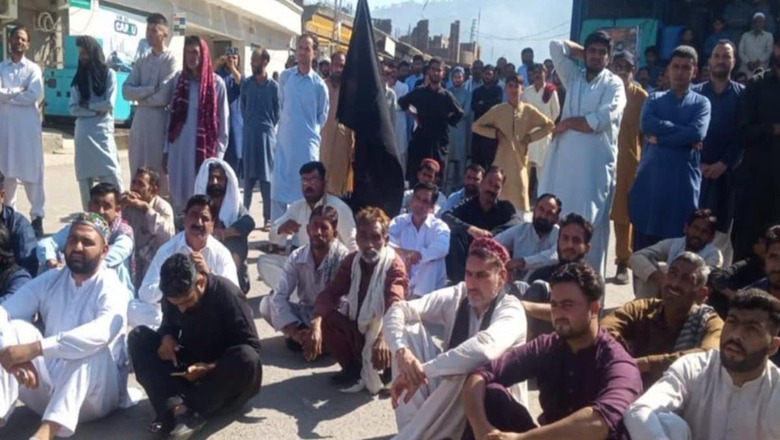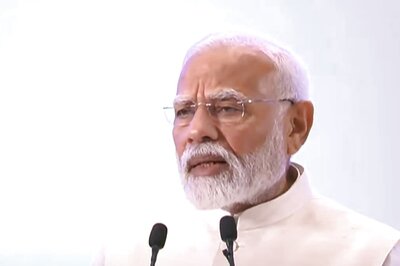
views
Two events herald the simultaneous resurgence of the resistance movement in Pakistan-occupied Jammu and Kashmir (PoJK) and Gilgit-Baltistan (GB). On November 21, 2023, hundreds of protestors hurled unpaid electricity bills on the motorcade of the Prime Minister of PoJK, Anwar Ul Haq Chaudhry, as he was exiting the city of Rawalakot in Poonch district after attending a funeral.
As he was headed for Muzaffarabad, the capital of PoJK, the Jammu Kashmir Joint Awami Action Committee (JKJAAC) was busy setting up a protest camp in the city. They have once again made an appeal to the consumers of electricity in PoJK to continue the boycott of the electricity bills that are already costing the PoJK government a loss of Rs 3 billion a month in revenue. On the same day, a second event took place in Gilgit-Baltistan where the Deeni Mushawarti Council (religious consultative council), a religious body comprising religious leaders, offered their services to the government to act as a moderator between the GB Awami (People’s) Action Committee and the state.
Popular resistance movements and communal-based sabotage in both PoJK and GB are nothing new to the region. Every time people come out to protest against additional taxes on electricity bills or cuts in wheat subsidies and the movement begins to gain momentum, the Pakistan government lets loose its religious proxies to infuse divisions among the ranks of the protestors using religious fault lines.
Tehreek e Tahafuz e Khatam e Nabuwat (Movement for the protection of the finality of the Prophet) is activated in PoJK against the so-called ‘imminent’ threat of an Ahmadiyya conspiracy to destabilise Pakistan. Likewise, in GB, the Sunni-Shia fault line is exploited to break the momentum of the resistance. However, in PoJK, it doesn’t seem to work and the boycott electricity campaign continues unabated.
The JKJAAC consists mostly of various traders’ associations, but recently the lawyers have also joined in sidelining the religious organisations such as the Jammat e Islami. In Mirpur, an All Azad-Kashmir Bar Association Conference inviting lawyers from the district was held on November 19, which led to another event called the All Azad-Kashmir Lawyers Convention that took place on November 23. Demands included the reversal of taxes on electricity bills but also that Pakistan should pay royalty on the Mangla dam which was constructed in 1963, which according to the speakers at the conference, has not been paid to the Azad-Kashmir government.
The newspaper sellers in Muzaffarabad have had their quota for wheat curtailed, depriving them of the previously government-approved quota of wheat for six months in a row. The quota of wheat has been reduced to eighty 20kg bags for each 1,000 residents. Staff and employees of Women University in Bagh in PoJK have indicated that they will start a pen-down strike if the government does not honour the promised increase in their salaries. Hence, PoJK seems to be heading towards a new revolutionary upsurge.
Let’s take a look at what is going on in GB. The paramedics have been on strike. Demands include revision of service structure, which means that promotions and pay scales that have not been revised for the past two decades must be addressed. Young Doctors Association will be joining the protest and at some point after November 24, the emergency departments in all hospitals will also be shut down.
The Skardu District Bar Association conducted an all-parties conference on November 22 on the same lines as the one in Mirpur, calling for a Baltistan-wide protest campaign against cuts in wheat subsidies. They have formed a committee that is going to meet up with various political parties and human rights groups, inviting them to join their campaign. Students at the Karakorum University have been holding protests against their Vice Chancellor, leading to the closure of the university for an indefinite period. The GB Awami Action Committee is already holding a PoGB-wide protest against cuts in wheat subsidies. On November 20, a massive protest rally against the cuts in wheat subsidies was held in Challas and was addressed by GB Awami Action Committee leader Fida Hussian. Similar protests have been held in Shigar, Kharmang, Ghizer and other cities in GB.
One political activist from GB sums up the current situation in GB.
“After complete deprivation of all basic democratic human rights, national identity, recognition of our civic rights, a new narrative has now (begun) to emerge,” he said.
“Gilgit-Baltistan is not part of the constitution or the geographical map or the federation of Pakistan. It is now being recognised (by the people of GB) as a disputed region. If Pakistan cannot support Gilgit-Baltistan (economically) then the people should withdraw their support to Pakistan,” he further said.
“The dialogue (for rights) between the salve and the master has been going on for a long time without yielding any results (therefore) the administration and the management of Gilgit-Baltistan should be handed over to the United Nations,” the activist said.
“The ruling elite (of GB) is also now demanding that until such time that the Kashmir issue is resolved, the affairs of Gilgit-Baltistan to be handed over to locals,” he said.
The above statement reveals the desperation of the population of GB through the eyes of its intellectuals. The question remains though whether or not the current revolutionary upsurge will be able to transform itself into a revolutionary uprising, leading to the independence of both PoJK and GB.
This primarily depends on the political consciousness of the leadership but more importantly on that of the general population. In times of revolution, the masses always learn quicker than in periods of lull. In order for the current revolutionary upsurge to transform itself into a revolutionary uprising that leads to total independence from Pakistan, the demands of the movement need to be transformed from mere economic ones into political ones.
But for that to happen, the inability of Pakistan to meet the economic demands will have to become absolutely clear and recognised by the general population of both occupied territories. Secondly, link the above with the realisation that one of the world’s richest territories occupied by Pakistan holds more than Rs 120 trillion worth of natural and mineral resources and that until they are freed from the clutches of Pakistan, they cannot become masters of our lands and therefore prosperity in both PoJK and GB will remain a distant dream.
Join the two perspectives and you have a revolution at your hands.
Dr Amjad Ayub Mirza is an author, broadcaster and human rights activist from Mirpur in PoJK. He currently lives in the UK. Views expressed in the above piece are personal and solely that of the author. They do not necessarily reflect News18’s views.



















Comments
0 comment